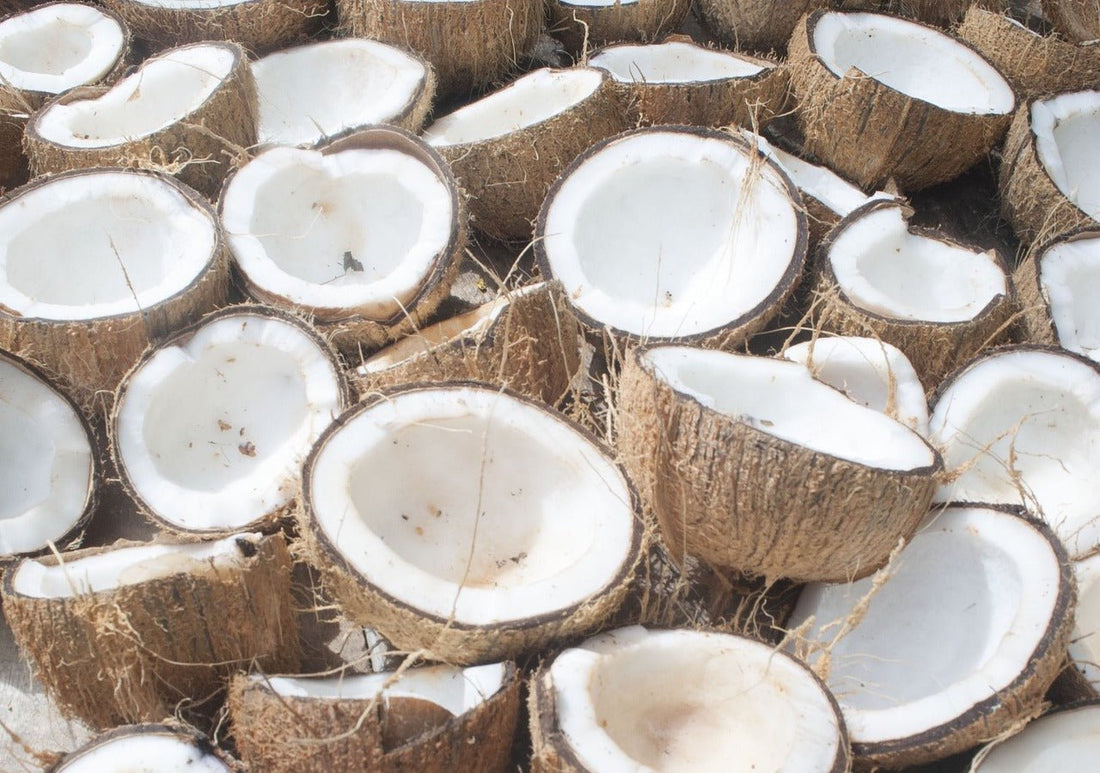Looking for accurate information on coconut oil as a skin cleanser can be overwhelming. Factor in any sensitivities or concerns and it feels like there is never a right answer to when/how to use coconut oil on the skin. Let’s debunk some myths together and find out how coconut oil functions in soap.

Coconut Oil in Soap: The Truth
Share
Is it safe to use body and face washes that contain coconut oil?
The short answer is yes, absolutely! Here are some of coconut oil’s highest praises:
- Coconut oil contains medium-chain fatty acids that replenish the skin’s natural properties
- These acids are also antimicrobial and protect the skin from harmful bacteria
- Antioxidants in coconut oil help defend skin from the elements and pollution while combating signs of aging
- Coconut oil’s high fat content helps fight dry skin and retain moisture
- This particular oil is not volatile; it’s soothing to the skin non-irritating
Keep reading for the down-low on whether or not cleansing with coconut oil ingredients will irritate your skin type.
Are there different types of coconut oil?
Yes. We recommend unrefined “virgin” coconut oil, as it’s highest in antioxidants. However, there is no global standard or certification that determines which coconut oils can be classified as “virgin.” A company can essentially market these oils in any way it wants.
Cover all your bases by double checking ingredient labels-- which is always a good idea, BTW, even if a label says “natural” or “green.” Double check there is no fragrance, flavor, or dye added to the coconut oil.
Coconut oil on the skin
It’s easy to associate feeling clean with a bubbly lather, but scientifically, like dissolves like. This means that skin-safe oils (like coconut) effectively lift the sebum we produce throughout the day.
It also softens and loosens blackheads and whiteheads, helping to clear pores and remove dead skin. There is a caveat, though. If you’re breakout or congestion-prone you should avoid using any post-cleansing skincare that contains coconut oil.
Coconut oil is still a fantastic, natural makeup remover and a great first step in a double-cleansing routine for any skin type. While it’s true that coconut oil is comedogenic and can clog pores, it can only clog pores if it forms a barrier on the skin (e.g., as a moisturizer). Acne-prone skincare aficionados: be sure to break down coconut oil by rinsing your face clean with a second face cleanser. Note: there are other oils, like, sweet almond oil, that have similar benefits and pose less risk for sensitive skin groups.
Just as a second wash will remove the slickness from your skin after cleansing with coconut oil, coconut oil in face and body washes are mixed with other cleansing properties and formulated to rinse clean.
A natural, plant-based product that can fight pimples and dry patches simultaneously? You can see why it’s key in our hero product.
Coconut Oil in Redoux Products
All Redoux Cleansing Bars are made with high quality, unrefined virgin coconut oil.
We use coconut oil as a primary ingredients to help break down the oils and dirt that accumulate on the skin between washes. It also ensures the cleansing bars are not stripping or dehydrating, but softening and moisturizing. The coconut oil working harmoniously with star botanical ingredients in each bar, such as: turmeric and rose clay in the "529" Turmeric Cleansing Bar, spirulina and rice milk in the "Bathhouse" Cleansing Bar, activated charcoal and kaolin clay in the "Don't Think" Activated Charcoal Cleansing Bar, and Brazilian Red Clay in the "Room 621" Cleansing Bar.
Thanks to the high quality coconut oil, every bar creates a dense lather sweeps grime up and gets washed away so skin is left clean, not clogged.
